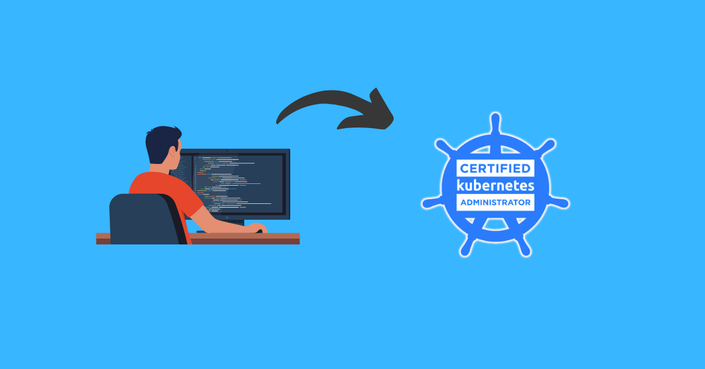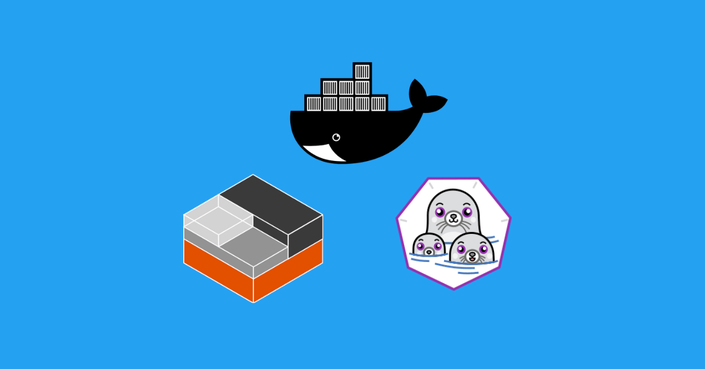Beyond Certification: Real Kubernetes Skills
I created this course not just to help you pass the CKA certification exam.
While practicing CKA questions can get you certified, true confidence in working with Kubernetes requires more.
My goal is to equip you with the skills of a real Kubernetes administrator, someone who understands all the critical nuances of the platform.
I deployed my first Kubernetes cluster in 2015 when Google launched its GKE service. Since then, I've worked on multiple Kubernetes implementations.
One thing I’ve learned is that understanding Kubernetes' core components, resources, storage options, secrets management, real-world workflows, and best practices makes a real difference in handling real-world projects.
In this course, I’ve shared the knowledge needed to grasp these core concepts and laid a foundation for further research and deeper learning.
You can also ask questions in our dedicated CKA exam Discord channel or community forum. Our certified Kubernetes experts, with real-world production experience, are here to help!
I continually update this course based on user feedback, adding lessons that will help learners not only in their daily work but also in job interviews. You’ll receive an email notification every time a new lesson is added.
CKA Course Curriculum
- Introduction
- Setup Virtual Machines
- Kubeadm Cluster Prerequisites
- Firewall Requirements
- Kubeadm Workflow (1:42)
- Provision underlying infrastructure to deploy a Kubernetes cluster
- Create Kubeadm Config
- Initialize Kubeadm Cluser
- Join Worker Nodes
- Install the Network Plugin
- Deploy Metrics Server
- Validate the Cluster
- Deploy a Sample Application
- Configure Kubeconfig File in Workstation
- Introduction
- How Does Deployment Work?
- Updating & Scaling Deployment
- Create Deployment Using Imperative Commands
- Deployment Creation Using Declarative Method
- Rolling Update and Rollbacks
- Perform a Rolling Update and Rollback of a Deployment
- Pause & Resume Rollouts
- 🎯 Scenario 01: Create a Deployment
- 🎯 Scenario 02: Debug a Deployment
- 🎯 Scenario 03: Edit a Deployment
- 🎯 Scenario 04: Update a Deployment using Rolling Update Strategy
- 🎯 Scenario 05: Update a Deployment using Recreate Strategy
- 📚 Quiz Time
- Introduction
- How Does HPA Work?
- 🎁 Bonus: How Does Metrics Server Work
- Working With HPA
- Memory Based Scaling
- 🎁 Bonus: Custom Metrics Scaling
- 🎁 Bonus: Scaling With External Metrics
- 🎯 Scenario 01: Deploying a Microservice with HPA
- 🎯 Scenario 02: Deployment with Dual-Metric HPA
- 🤔 Corner-Case Q&A
- 📚 Quiz Time
- Introduction
- Understanding Role & RoleBinding YAML Specification
- Working With Roles and Role Bindings
- Working With Cluster Roles and ClusterRole Bindings
- Adding Roles and ClusterRoles to Service Accounts
- 🎁 Bonus: Creating API token for a ServiceAccount
- 🎯 Scenario 01: Create ClusterRole To Provide Access
- 🎯 Scenario 02: Create Role To Provide Access
- 🎯 Scenario 03: Provide Access to Non Resource URLs
- 📚 Quiz Time
- Introduction
- Working With ConfigMap
- Updating ConfigMaps
- 🎁 Bonus: ConfigMap Update Delays
- 🧩 Real-world Scenario
- Immutable Configmap
- 🎁 Bonus: Immutable Configmaps Improve Performance
- ConfigMap Imperative Commands
- 🎯 Scenario 01: Create a ConfigMap
- 🎯 Scenario 02: Externalizing Configuration for a Web Server
- 🎯 Scenario 03: Configuration Management for Web Application Services
- 🎯 Scenario 04: Debugging ConfigMap Issue
- 📚 Quiz Time
- Introduction
- Base64 encoding
- Secret Types
- Working With Secrets
- Injecting Secrets into Pods
- Secret Imperative Commands
- 🎯 Scenario 01: Create a Secret
- 🎯 Scenario 02: Configure a Secret Into a Pod
- 🎯 Scenario 03: Configuring Nginx with TLS Secret in Kubernetes
- 🎁 Bonus: Managing Secrets In Real World Setup
- 📚 Quiz Time
- Introduction
- 🎁 Bonus: How Kubernetes uses Cgroups and CFS to Manage Resources
- Pod Quality of Service (QoS)
- Working With Requests & Limits
- Resource Quota
- Limit Ranges
- 🎯 Scenario 01: Setting CPU Requests and Limits
- 🎯 Scenario 02: Listing CPU and Memory Resources of Pods
- 🎯 Scenario 03: Fix the Problematic Pod
- 🎯 Scenario 04: Analyzing kube-proxy Pod Memory Usage
- 🎁 Bonus: Capacity Planning Real World Example
- 📚 Quiz Time
- Introduction
- Kubernetes Services
- Working With Services
- Inside Kubernetes Services
- 🎁 Bonus: Why EndpointSlices?
- DNS Based Service Discovery
- Default Kubernetes Service
- NodePort Service
- 🎁 Bonus: How Does NodePort Work
- Load Balancer Service
- 🎁 Bonus: MetalLB With Kubeadm
- Externalname Service
- Environment Variables
- 🎯 Scenario 01: Expose Webserver Using NodePort
- 🎯 Scenario 02: Expose application interally
- 🎯 Scenario 03: Fixing Deployment and Service Issues
- 🎯 Scenario 04: Deploy and Test Connectivity Between Apps
- 📚 Quiz Time
- Introduction
- Ingress
- 🎁 Bonus: Ingress Controller: Internal Workflow
- Setup Ingress Controller
- Multiple Ingress Controllers
- Ingress Object
- Ingress Demo Application Architecture
- Deploy Demo Application
- Create Ingress Objects
- Ingress TLS
- Create Ingress TLS
- 🎯 Scenario 01: Expose Web Application Via Ingress
- 🎯 Scenario 02: Troubleshoot Application Ingress
- 🎯 Scenario 03: Implement Path Based Routing
- 🎯 Scenario 04: Implement TLS For Ingress
- 📚 Quiz Time
- Introduction
- Gateway API Controller
- Gateway API Resources
- GatewayClass
- Gateway
- HTTPRoute
- ReferenceGrant
- Seperation of Concerns
- Deploy Gateway API CRDs
- Setting Up Nginx Fabric Controller
- Create GatewayClass
- Deploy a Demo Application
- Create Gateway
- Create HTTPRoute
- Cross Namespace Routing
- Canary Deployments Using HTTPRoute
- GatewayAPI TLS
- Create Gateway TLS
- Cleanup
- 🎯Scenario 01: Expose a web application using GatewayAPI
- 🎯Scenario 02: Encrypt Traffic using GatewayAPI TLS
- 🎯Scenario 03: Migrate the Ingress config to Gateway API
- 🎯Scenario 04: Cross Namespace Routing with ReferenceGrant
- 📚 Quiz Time
- Introduction
- Kubernetes Network Policy
- Network Policy Object
- Deploy Demo Application
- Deny all Ingress and Egress Traffic
- Implement Network Policies for Secure Communication Between Services
- Default Deny Network Policies
- Common Pitfalls and Key Concepts
- 🎯 Scenario 01: Secure Namespace Communication with Network Policies
- 🎯 Scenario 02: Implement Secure Egress with IP CIDR-Based Restrictions
- 🎯 Scenario 03: Secure Database Access with NetworkPolicy
- 📚 Quiz Time
FAQS
What is the Certified Kubernetes Administrator (CKA) certification?
The Certified Kubernetes Administrator (CKA) certification is a professional credential offered by the Cloud Native Computing Foundation (CNCF) that validates your skills and knowledge in managing Kubernetes clusters.
It covers the essential tasks of deploying, managing, and troubleshooting Kubernetes applications, giving you the expertise needed to work with production-grade Kubernetes systems. This certification is highly regarded in the tech industry and can enhance your credibility and career opportunities in cloud and DevOps roles.
Who should take the CKA certification course?
The CKA certification course is ideal for IT professionals who want to work with Kubernetes, including DevOps engineers, cloud engineers, system administrators, and anyone interested in managing containerized applications at scale.
It is designed for those who wish to gain hands-on skills and a deep understanding of Kubernetes to support, deploy, and troubleshoot clusters in a professional environment.
What are the prerequisites for the CKA certification?
To prepare for the CKA certification, it is helpful to have a solid understanding of Linux commands, containerization concepts (such as Docker), and basic networking.
Familiarity with YAML syntax and concepts of cloud infrastructure is also beneficial. These foundational skills will make it easier to learn Kubernetes and excel in both the course and certification exam.
How much time will it take to prepare for the CKA exam?
Preparation time varies but typically takes several weeks to a few months, depending on your familiarity with Kubernetes and the amount of time you can dedicate to studying.
Are there practice exams in this course?
Yes, we provide practice scenarios to help you get familiar with the exam format and build your confidence.
What happens if I fail the CKA exam?
You can retake the exam after a waiting period, as specified by the official CKA retake policy.
How long is the CKA certification valid?
The CKA certification is valid for two years, after which you’ll need to renew it by retaking the exam.
Can this course help me with real-world Kubernetes tasks?
Absolutely. Our course emphasizes hands-on skills, preparing you to work confidently with Kubernetes in production environments.
What career benefits can I expect after obtaining the CKA certification?
With the CKA certification, you can expect enhanced job opportunities, higher salaries, and a competitive edge in DevOps and cloud computing roles.



